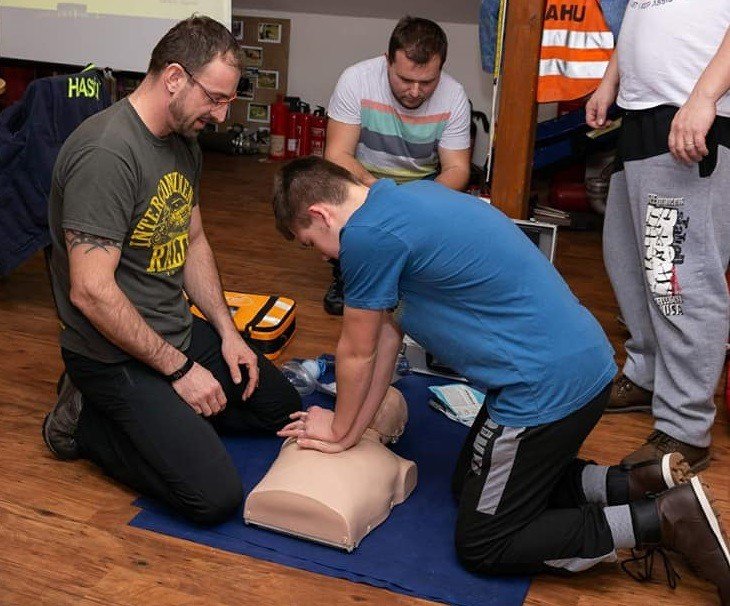PARAMEDICS RECOMMEND BODYID BRACELETS!⚕️
This topic seems to be rather tricky. Usually, when we send a message like this out into the world, we get a few negative and disbelieving comments.
We do not claim that all paramedics know us and that they are recommended by absolutely everyone. But there are a few that do.
👉Let's talk about how it actually is:
❌ No, in an accident, paramedics do not proactively look for bracelets with contacts and information about your health.
❌ No, information about your blood type will not be taken into account by paramedics and they will always do the test themselves.
✅ Yes, if the bracelet is in a visible place and the paramedics discover it, they will take into account the health information and this information will help to choose the appropriate method of treatment and significantly save time.
✅ Yes, some paramedics wear the bracelet themselves and consider it a wonderful thing that can save a life.
✅ Yes, thanks to the phone contacts on the bracelet, it is almost always possible to call family members - the bracelet is discovered in the hospital at the latest
✅ Yes, we have a whole series of real stories when bracelets really helped someone


Jan Smolucha, Paramedic
"As a paramedic, I can only recommend the Body ID bracelet. I have it myself. Over the years of experience with emergency services, it has often been difficult to find the patient's identity, and I'm not talking about personal history or allergies".
In addition to rescue practice, Hozna Smolucha is also a first aid trainer and often provides first aid at various events, especially sports.
Answers by Lucie Urbanová, DiS., press officer of the Olomouc Region Health and Rescue Service, contribution organization

What do you see as the benefits of the bracelet for paramedics? Can the information on the bracelet make your work and time easier when rescuing a person?
Definitely yes; the ID bracelet contains the most important information about the person in question, so if they are unconscious and we cannot get information about their health, in that case, the entire medical history can be found in the medical history based on the name, and we can thus find out what the given person would be dealing with condition could be related.
People sometimes argue that rescuers cannot follow the information on the bracelet, because bracelets are not enshrined in any regulations, and that they have to check everything, that the bracelet does not have to belong to the wearer, etc. What is your opinion on this?
Of course, if the person is conscious and oriented, or it will be in the family circle and the patient or family is able to give us the necessary information, we benefit from them or from the medical documentation handed over to us. However, if a person collapses somewhere outside and is alone, has a disorder of consciousness, and we find an ID bracelet on his hand (or a soldier's dog tags), then we draw information from them - the probability that a person puts a stranger's bracelet on his hand with different information? I doubt it and it never even happened!
We also hear opinions that the rescuers do not know about the bracelet. So how is it? Do they know or not :)? And how did you actually find out about them?
Awareness will probably vary; the younger generation using facebook or instagram will probably get to this product more easily than older colleagues, however, after each visit to the patient, a general examination is carried out, the so-called "examination from head to toe" and the bracelet can thus be easily found (if the person in question does not have it in his backpack or just forgets his bracelet at home).
What led you to buy a bracelet? And what did your friend, also the paramedic for whom you bought it, say about the bracelet?
In fact, my friend initially came across the bracelets and we were both extremely excited! It's a really great idea and it can make our work as rescuers much easier and treat the given patient in a targeted and timely manner - thus reducing the total time of the entire examination and treating in time (sometimes the anamnesis is ascertained for quite a long time when no one knows anything and the patient's health may deteriorate status).
What information would you recommend to be laser marked on the bracelet? What will help the rescuers the most?
Clearly, the name and year of birth (whether it can be verified both by documents and by being contacted or by witnesses) and then health problems: especially allergies (very important!), and if the person is diabetic, hypertensive, or asthmatic. In the next step, also emergent contacts (with the abbreviation tel., ICE, SOS, etc.) - so you can call the nearest and verify and find out information about the patient. The motto on the bracelet is nice - however, it won't save a person's life in an emergency, so I would dedicate the lines to more important things - e.g. blood type.
